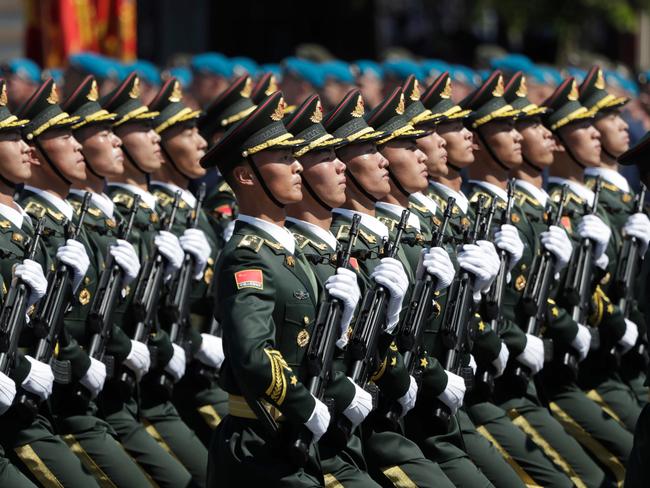Peta Credlin: Cutting emissions could see Australia fall victim to China
Australia could one day have to make a horrible choice between fighting an unequal war or becoming tributary states of China. And it could be all because we cut emissions, writes Peta Credlin.
Opinion
Don't miss out on the headlines from Opinion. Followed categories will be added to My News.
How many of us are expecting a latter-day Pearl Harbor, a repeat of the sneak attack on the American Pacific fleet?
Well, former general, now Senator Jim Molan, says we have to plan for it; only this time, he fears, a Chinese surprise attack on all US bases and forces in the western Pacific could be so devastating that a bewildered America might lose the will to fight, and US allies like Japan, South Korea and – yes – Australia could have to make a horrible choice between fighting an unequal war or becoming tributary states of China.
In his new book, Danger On Our Doorstep, that should be compulsory reading for all policy makers, Molan presents a scenario that’s far from certain but definitely possible.
China is building killer satellites that could blind technology-dependent US forces; is working on submarines that could cut the cables on which the world’s communications depend; has built up a military force that, on paper, is more-than-a-match for the US, at least if fighting is contained in China’s region; and is trying to make itself impervious to Western economic and financial sanctions.
As Beijing demonstrated this week, it’s deadset on taking Taiwan, by force if necessary; and it’s proclaimed time and again its intention to be the world’s number one power within three decades.

The Molan thesis is that, instead of working up to a D-Day style invasion of Taiwan over many months, that would enable other countries to prepare counter-measures; China will strike first with a knockout blow against the US that would make resistance from Taiwan suicidal and that would force China’s neighbours to become essentially client states under the figleaf justification of “Asia for the Asians”.
Molan doesn’t expect this just yet, because even a single-minded communist leadership bent on world domination would take time to steady itself for such an enormity, but it wouldn’t be entirely beyond China to take advantage of the Ukraine crisis to strike now.
Things are that serious and urgent.

A few qualifications are in order. Maybe the Chinese military is not as good in practise as it seems on paper, as Russia’s has turned out to be in Ukraine.
Maybe work by the US to protect its satellites has gone further than is public.
Maybe the US would respond to an unprovoked attack on its forces with a missile strike on China’s own bases that would even the score.
All these uncertainties could stay the hand even of a Chinese leadership hellbent on revenge for what they regard as a “century of humiliation”.
Molan’s point, though, is that Australia can’t persist in assuming that China’s leadership is not so different than our own.
Hence our need, with extreme urgency, not just to strengthen our armed forces with defensive and offensive missiles; but to build national resiliency with much greater stocks of essential stores and armament; and to talk realistically with the US and our other allies about how, in practice, a whole series of brutal contingencies might practically be met.
Almost nothing is worse than war, says Molan, except losing one. And if war is forced upon us, the retired general says, right now, we’d lose.
Even though it would be an abomination were the free people of Taiwan to be forcibly subjected to the dictatorship of Beijing; and even though the subjugation of Taiwan – whether through US acquiescence or defeat – would mean the end of the US-led post-war order that has created quite literally the best times in human history, I’m not sure that Australia is quite ready to suffer massive casualties in defence of Taiwan.

But what we must stop, if we are to survive as a nation, let alone to flourish, is deliberately making ourselves weaker when our great strategic threat is becoming ever more menacing.
Last week our parliament started to entrench in legislation a 43 per cent emissions reduction within just eight years, as a floor and not a ceiling.
And to make net-zero-by-2050 not just government policy but L-A-W law.
It stands to reason that closing down 60 per cent of the coal-fired power currently providing 60 per cent of our electricity, by 2030, will have massive costs.
And that achieving net zero, not just in the power sector, but in agriculture and transport will require an colossal economic and social transformation.
Just eliminating emissions in the power sector, if this is to be done using wind and solar, was forecast by Macroeconomics Advisory to cost $700 billion.
Why are we doing this to ourselves, to cut our 1 per cent of world emissions in order to be a “good global citizen”, when the country that’s imposed $20 billion of arbitrary bans on our trade, and that’s threatening all its neighbours, is doing no such thing?

Indeed, China, the world’s largest emitter, is massively increasing its emissions and is boosting its coal-fired power station fleet, every year, by more than the current Australian total.
With the news on Friday that Australia’s coal exports have tripled in just 12 months – and that our gas exports have surged too – it’s pretty clear that whatever the rest of the world might SAY about climate change and reducing the use of fossil fuels, that’s not what’s being DONE.
And as for China, we are quite literally shovelling our coal into the dragon’s mouth and they’re only getting stronger, and more restless.
Watch Peta on Credlin on sky news, weeknights at 6pm





